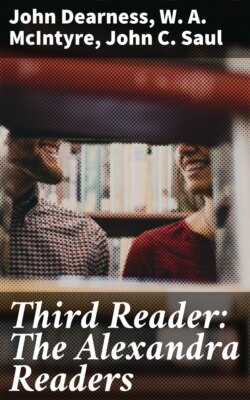Читать книгу Third Reader: The Alexandra Readers - John Dearness - Страница 24
На сайте Литреса книга снята с продажи.
CÆDMON
ОглавлениеTable of Contents
On one of the dark, rugged cliffs that jut out into the sea from the eastern part of England, stood, many centuries ago, the monastery of Whitby. At this time the people of England were still very ignorant. Only the monks and nuns knew how to read or write. The rest of the people were either warriors, or else simple-minded shepherds and farmers.
In this monastery lived a servant whose duty it was to attend to the sheep and cattle. In the evenings, very often, his companions were in the habit of gathering together in the common hall or banquet room. There it was the custom, while the feast was going on, for each one in turn to take the harp as it was passed around the table, and make up some simple song to entertain his friends. Although these people knew nothing about reading or writing, they were wonderfully clever at singing songs and accompanying themselves on the harp.
Only the herdsman who attended to the sheep and cattle, and whose name was Cædmon, could never sing. So whenever the feasting time came, and his comrades began to pass the harp from one to another, he, being ashamed of his lack of skill, would leave the banquet hall to go alone to the little house where he slept.
One night, after he had left his comrades, and had attended to all the wants of the cattle under his care, he, as usual, went to sleep, and in his sleep he had a wonderful dream. He dreamed that to his door came a beautiful youth, with a light shining about his head, who said to him, “Cædmon, sing for me.” Cædmon answered: “But thou knowest I cannot sing. That is why I left my companions in the banquet hall, and came here to my lonely hut.” “Try,” said the beautiful youth, “and thou shalt find that thou canst sing.” Then Cædmon in wonder asked, “What shall I sing about?”—“Sing of the beauty of the world, and the glory of the stars and the skies, and of all that is on the earth,” was the answer.
Then in his sleep Cædmon sang a beautiful song, just as the youth had commanded him. But the strangest thing was that when he awoke he remembered every word of the song, and not only that, but he found he could sing a song about any thought that came into his mind; whereas, formerly, he had never been able to sing at all.
Wonderful, indeed, all this seemed to the humble shepherd. He told his companions about his dream, and they led him to the abbess, who was chief in the monastery, and bade him sing his songs for her.
So he sang. All the wise monks came to hear him, and tears came into their eyes at the beauty of his song; for when he sang, the sky and the earth and the sea these men had known all their lives seemed suddenly to be filled with a new glory. They all said that Cædmon had received a wonderful gift from God, and that he must use it in a holy way.
From that day on some one else guarded the sheep and the cattle in the monastery of Whitby; and the former shepherd learned to read and write, and became one of the monks of the abbey. Many and beautiful and holy were the songs he wrote. They were written in Anglo-Saxon, the language spoken by the ancestors of the English people, and this simple shepherd, Cædmon, who was the first of the Anglo-Saxon poets, was therefore really the father of all English poetry.
—Grace H. Kupfer.
